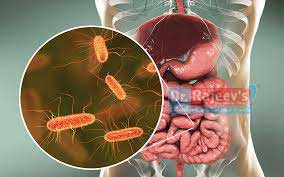


Escherichia coli (E. coli) bacteria normally live in the intestines of healthy people and animals. Most varieties of E. coli are harmless or cause relatively brief diarrhea. But a few particularly nasty strains, such as E. coli O157:H7, can cause severe abdominal cramps, bloody diarrhea and vomiting.
One may be exposed to E. coli from contaminated water or food — especially raw vegetables and undercooked ground beef. Healthy adults usually recover from infection with E. coli O157:H7 within a week, but young children and older adults have a greater risk of developing a life-threatening form of kidney failure called hemolytic uremic syndrome.
Signs and symptoms of E. coli O157:H7 infection typically begin three or four days after exposure to the bacteria, though one may become ill as soon as one day after to more than a week later. Signs and symptoms include:
Among the many strains of E.coli, only a few trigger diarrhea. One group of E. coli — which includes O157:H7 -produces a powerful toxin that damages the lining of the small intestine, which can cause bloody diarrhea. One develop an E. coli infection when one ingest this strain of bacteria.
Unlike many other disease-causing bacteria, E. coli can cause an infection even if one ingest only small amounts. Because of this, one can be sickened by E.coli from eating a slightly undercooked hamburger or from swallowing a mouthful of contaminated pool water.
Potential sources of exposure include contaminated food or water and person-to-person contact.
The most common way to acquire an E.coli infection is by eating contaminated food, such as:
Human and animal feces may pollute ground and surface water, including streams, rivers, lakes and water used to irrigate crops. Although public water systems use chlorine, ultraviolet light or ozone to kill E. coli, some outbreaks have been linked to contaminated municipal water supplies.
Private wells are a greater cause for concern because they do not often have any disinfecting system. Rural water supplies are the most likely to be contaminated. Some people also have been infected after swimming in pools or lakes contaminated with feces.
Most healthy adults recover from E. coli illness within a week. Some people particularly young children and older adults may develop a life-threatening form of kidney failure called hemolytic uremic syndrome.
Arsenic Album : Useful for E.coli infection that arises as a result of food poisoning. There is severe diarrhea where the stool is watery, copious and fetid with cutting pain in the abdomen.Useful wih marked fatigue and loss of strength are present.Useful when consuming the smallest amount of food or drink lead to stool and vomiting.
ALOES : Very useul medicine for E.coli infection with severe diarrhoea. There is thin, watery, yellow and hot stool. There is a feeling of fullness in the rectum with a continued urge to pass stool.There is also the release of excessive flatus after passing stool.Very useful for burning at the anus along with rumbling and cramping in the abdomen during stool.
China : Useful for E.coli where there is marked fatigue. Useful for loose, copious, frothy stool with extreme debility due to loss of body fluids.Useful when patient may experience colic before and after every stool.
Veratrum Album : Useful for E.coli with copious watery stool and vomiting .There is pinching colic felt in the abdomen during stool.Useful for exhaustion and fainting along with copious vomiting. There is cold sweat on the forehead and chilliness .
Croton Tig : Useful for E.coli infection to manage diarrhea with sudden, gushing stool .Useful for watery stool which passes out of the rectum in one single gush. There is yellow or greenish stool mixed with whitish flakes.Very useful when drinking and eating anything leads to a stool.
RL 27